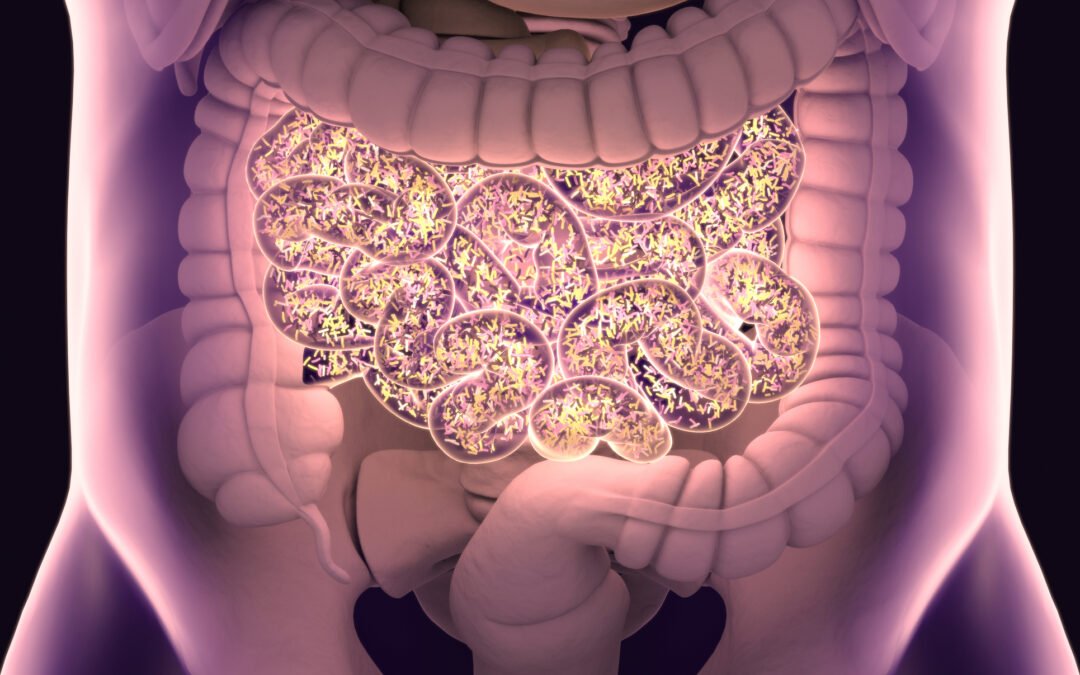The human gut, or gastrointestinal tract, is emerging in research as the most essential organ system for overall health and disease prevention. This exciting new information is revolutionizing how we think about human health. The communities of beneficial microbes (microbiota) living in and on various parts of your body make up your “microbiome” (microbiota plus their genetic material). These bacteria are mainly concentrated in the gastrointestinal tract and exist to help us maintain good health.
The gut is also home to the enteric nervous system, known as the second brain. The enteric nervous system has two layers of over 100 million nerve cells lining the digestive tract. Research shows evidence that gut dysfunction does more than interfere with digestion, absorption, blood flow, and immune responses. Irritation in the digestive tract and imbalanced gut bacteria may send signals to the central nervous system that affect mood, cognition, and behavior. Therefore, gut health is key to healing the whole body.
Balance the Microbiome to Improve Gut Health
When the bacteria are diverse and well-balanced (symbiosis), they keep the body healthy. When they’re out of balance (dysbiosis), potentially disease-causing bacteria can outnumber the beneficial microbes and create a toxic intestinal environment. This weakens the gut barrier and allows bacterial toxins and undigested food particles to pass into the bloodstream. This imbalance increases your risk of chronic diseases, especially heart disease, diabetes, dementia, and cancer, the top four concerns of our aging population. In fact, an imbalanced microbiome is now being linked to a wide range of health conditions, including:
- Obesity and struggles with weight
- Insulin resistance/metabolic syndrome
- Depression, anxiety, and mood disorders
- Schizophrenia and other mental health disorders
- Skin disorders (acne, eczema, psoriasis)
- Autoimmune diseases
- Inflammatory bowel disease (Crohn’s, ulcerative colitis)
- Irritable bowel syndrome
- Neurological conditions
- Constipation/diarrhea
- Celiac disease
- Rheumatoid arthritis
- Asthma
- Allergies/food sensitivities
- Thyroid disorders
Maintain Barrier Integrity
The gut is the gateway to the rest of the body. The intestinal barrier, located in the small intestine’s lining, prevents harmful substances from entering our body. When that barrier is damaged or compromised, bacterial toxins and other foreign molecules can pass through it and enter the bloodstream. This is known as intestinal permeability, or what many refer to as “leaky gut,” another root cause of chronic health conditions, including food sensitivities.
A balanced microbiota not only helps maintain barrier integrity but also assists with performing several essential functions. They help with digestion, detoxification, and absorption of nutrients. These bacteria also synthesize nutrients (B vitamins, biotin, and vitamin K), produce antibodies, and help defend against potentially harmful microorganisms. Our friendly gut bacteria teach the immune system how to recognize friends from foes. Suppose your microbes are not fed properly with polyphenol-rich foods and fiber. In that case, they will feed on you, eating away at the protective mucous lining, depleting and further weakening the intestinal barrier.
Gut Offenders
Emerging science shows that a variety of factors can disrupt the microbiome. The following lists the most common offenders when it comes to gut health:
- Medications such as antibiotics, birth control, non-steroidal anti-inflammatory drugs (NSAIDs), anti-depressants, antacids, and more
- Chronic stress, which can affect gut permeability and change bacterial composition
- Exposure to environmental toxins, especially pesticides, herbicides, heavy metals (lead, mercury, arsenic), and plastics (Bisphenol-A)
- Food toxins, including artificial preservatives, colorings, sweeteners, hormones, antibiotics, chemical additives, and, in some cases, wheat and gluten
- Dental toxins, including mercury amalgams, infections, root canal toxins, and poor oral hygiene
- Inadequate bacterial acquisition at birth (C-section, parents gut health, inadequate breastfeeding)
- Current health or disease status
How to Restore Gut Health
The good news is that our intestinal cells can regenerate, and the lining can be repaired. In fact, the intestine is the most highly regenerative organ in the body, regenerating its lining every three to five days. This continual cell renewal allows the lining to withstand the constant wear and tear of breaking down food, absorbing nutrients, and eliminating waste. To improve gut health, follow functional medicine’s 5R approach:
- Remove the gut offenders listed above as best you can to minimize cumulative damage.
- Replace the digestive tract with foods rich in enzymes, fiber, and nutrients for optimal function.
- Reinoculate with beneficial bacteria by consuming fermented foods (yogurt, sauerkraut, miso, tempeh, kimchi, kombucha, etc.) or by taking a probiotic supplement. This repopulates the gut with beneficial bacteria. Fecal Microbiota Transplant (FMT) therapy is another way to reinoculate the digestive tract.
- Repair the intestinal lining with gut-healing foods and nutrients.
- Rebalance the nervous system through stress reduction, meditation, restful sleep, and physical activity.
Diet is the Most Powerful Factor
You can change and improve your microbiota in as little as 24 hours by changing your diet. Not only can diet help increase the diversity of beneficial bacteria, but it can also help restore the intestinal barrier (gut lining).
Consume plenty of polyphenol-rich foods.
Polyphenols promote the growth of beneficial bacteria and decrease disease-causing bacteria. Food rich in polyphenols includes berries (especially blueberries and black elderberries), apples, flax seeds, raw cacao, dark chocolate, black olives, pecans, and hazelnuts. Herbs rich in polyphenols include sage, peppermint, cloves, spearmint, celery seed, star anise, rosemary, and Mexican oregano.
Add some foods high in resistant starch to your diet.
Resistant starch feeds our beneficial bacteria. It is a type of starch that is not fully broken down and absorbed—it “resists” digestion. Research shows that resistant starch may improve metabolism, insulin sensitivity, and blood sugar. Resistant starch is found in plant foods such as beans/legumes, whole grains, green bananas, and some foods that are cooked and then cooled (potatoes, pasta, and rice—cold pasta/potato salads).
Strive for 30 (or more) grams of fiber daily.
The average person gets only about 15 grams of fiber daily. Double that by eating a wide variety of fruits and vegetables, whole grains, beans, nuts, and seeds.
Consider foods with gut-building nutrients and probiotics.
These include bone broth and fermented foods such as sauerkraut, pickles, yogurt, kefir, tempeh, and miso. Homemade bone broth and soups contain easy-to-absorb nutrients, gelatin, and collagen to support the gut barrier. Fermented foods offer beneficial bacteria to improve microbial diversity and balance.
Reduce processed foods, including added sugar.
Potential disease-causing bacteria thrive on starches, sugars, and highly processed foods. End of story.
Consider colostrum.
A colostrum supplement may help repair the intestinal lining, reduce inflammation, and protect the gut from pathogens.
Improve digestion.
Improving digestion can help rebalance gut microbiota and restore gut function.
- Chew each bite of food thoroughly (this is the easiest way to improve digestion).
- Eat with an upright posture at a table, slowly and mindfully.
- Balance cooked and raw vegetables. Cooked vegetables are easier to digest and absorb, especially for people with more severe digestive issues.
- Take a short walk after lunch or dinner. Studies show that physical activity increases microbial diversity.
When you focus on gut health and your microbiome, you may notice many non-digestive health improvements, such as a loss of excess fat, gains in energy, and better overall mood. Never underestimate the power you have to transform health by healing your gut through diet.
Get Professional Help
Professional intervention may be necessary for some people with a severely compromised microbiome to help restore a healthy balance. The Sanoviv Microbiome Restore Program provides a comprehensive approach to gut health. It includes targeted therapies to help remove offending microbes, as well as professional placement of Fecal Microbiota Transplant (FMT) therapy to reinoculate and balance the microbiome. This synergistic approach has helped many with digestive disorders to finally get their lives back. Even more exciting, it may potentially help those suffering from other non-digestive ailments, including neurological illnesses, autoimmune diseases, mental illnesses, arthritis, and many more.

